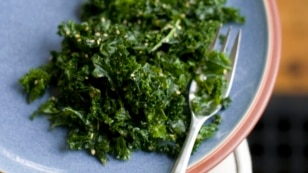
From VOA Learning English, this is the Health & Lifestyle report.
Americans love food trends. Much like clothing, some foods are more popular at times than others. The United States is currently experiencing a coconut craze.
Janette Rizk is a spokesperson for a popular store called Whole Foods Market in the United States. It has sold coconut water and coconut oil for years. But, Rizk says she has seen an increase in other coconut products in the stores she represents.
"We're seeing coconut oil in natural beauty products. We're also seeing things like the meat of the product being used in everything from flours, to tortilla chips, to milks and butters."
Some health experts say coconut can help fight infection in the body and raise its levels of good cholesterol.
Elissa Goodman is a holistic nutritionist. She says coconut has many health benefits.
"It revs up your metabolism. It also acts as an anti-viral, anti-bacterial, anti-fungal. So, it's great for the immune system. It's great for the heart. It raises your HDL (High-density lipoprotein) and it also is great for like any kind of urinary tract infections, any kidney issues, weight. I mean, the possibilities of using coconut oil for your health (are) endless."

HDL is what doctors call “good cholesterol.” Low-density lipoprotein, or LDL, is bad.
The Centers for Disease Control and Prevention in the U.S. provides information about cholesterol on its website. It says most of the body's cholesterol is LDL. High levels of LDL cholesterol can block arteries, the tubes that carry blood from the heart to the rest of the body. The blockages can lead to heart disease and stroke.
The CDC website says HDL cholesterol helps remove LDL cholesterol from the body. High levels of HDL cholesterol can reduce the risk for heart disease and stroke.
Walter Willett is a doctor and nutrition expert at Harvard University's School of Public Health.
Willett says there isn't yet enough research about how coconut oil affects the body to claim it is healthful. However, scientists and nutritionists do know the makeup of coconut.
Unlike other plant-based oils, coconut oil is a saturated fat. Willett explains that “coconut oil is about 90 percent saturated fat, which is a higher percentage than butter” which has about 64 percent.
Saturated fats are in animal fats, such as butter, meat, egg yolks, and in some plants like coconut and palm oils. In humans, saturated fat often increases cholesterol levels in the blood.
Unsaturated fats often come from plants. Eating foods high in unsaturated fats can reduce the amount of cholesterol in the blood.
Willett says that “too much saturated fat in the diet is unhealthy because it raises LDL cholesterol levels, which increases the risk of heart disease. But coconut oil also increases HDL cholesterol - the good cholesterol.
So, Dr. Willett says it is “less bad” than saturated fats that do not raise HDL levels.
Coconut oil might not be the new super health food that some claim. But moderate use in cooking could be a good for some people.
An important note when buying coconut oil: Look for “virgin” on the label. Make sure it is not hydrogenated or partially hydrogenated.
Hydrogenation is a chemical reaction that turns unsaturated fats into saturated ones. Hydrogenated fats are also called trans fats. The CDC says trans fats raise your bad cholesterol and may even lower good cholesterol.
And that's the Health & Lifestyle report.
I'm Anna Matteo.
Is coconut oil or coconut a part of your diet? Are there food trends where you live? Let us know in the Comments Section, where you can also share your favorite coconut recipe!
Faiza Elmasry reported this story for VOA News. Anna Matteo adapted it for Learning English and added additional information about coconut oil and cholesterol from a variety of websites. Caty Weaver was the editor.
Words in This Story
trend - n. something that is currently popular or fashionable
craze - n. something that is very popular for a period of time
holistic - adj. relating to or concerned with complete systems rather than with individual parts
nutritionist - n. a person whose job is to give advice on how food affects your health
benefit - n. a good or helpful result or effect
revs up - phrasal verb: to speed up
metabolism - n. biology : the chemical processes by which a plant or an animal uses food, water, etc., to grow and heal and to make energy
fungal - n. of, relating to, or caused by a fungus
immune - adj. not capable of being affected by a disease
urinary tract - n. the tract through which urine passes
artery - n. any one of the tubes that carry blood from the heart to all parts of the body

